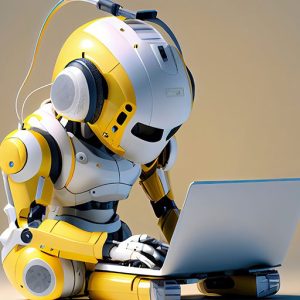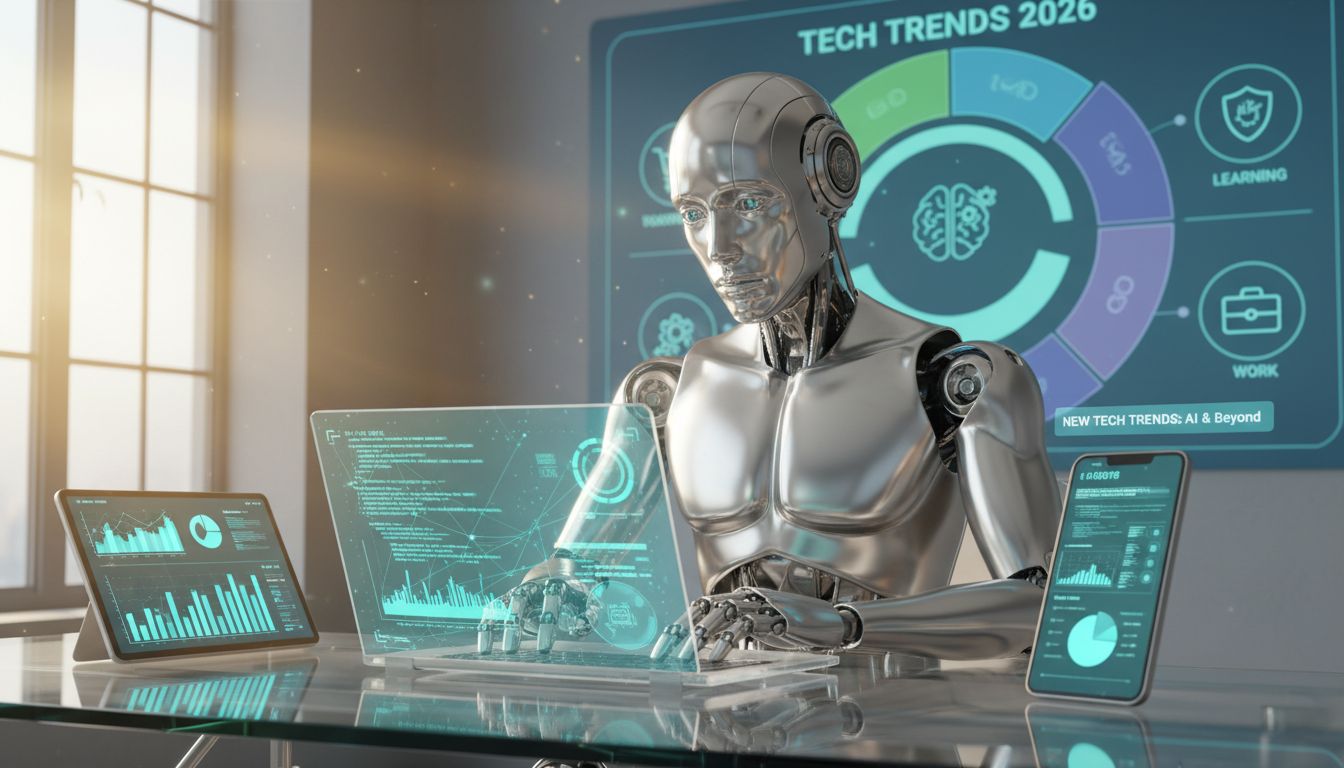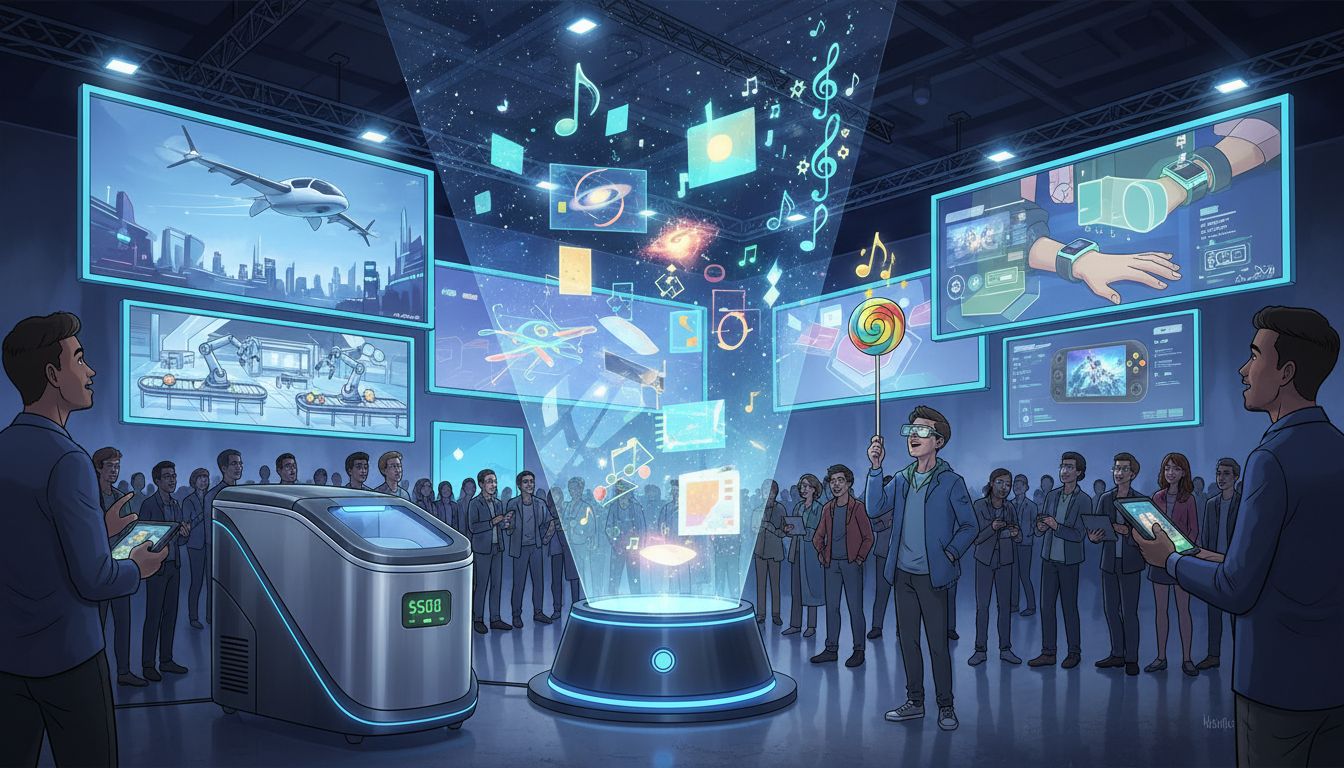The concept of singularity has captivated the minds of many as we continue to make rapid advancements in technology. This captivating idea, usually linked to AI and ML, brings up a lot of queries about what lies ahead for humankind and our relationship with highly intelligent machines.
In this blog post, we will explore the definition, history and potential benefits of singularity as well as how artificial intelligence contributes to its advancement while assessing its effects on society. We will also discuss how artificial intelligence plays a crucial role in bringing us closer to achieving singularity while examining its challenges and impact on society.
As we ponder a potential future in which human beings and highly developed machines could coexist or even merge their intelligence, it is essential to contemplate the implications of such progress. Join us as we explore predictions for the future of singularity and weigh both potential benefits and risks involved in reaching this technological milestone.
Finally, learn how you can prepare yourself for a post-singular world economically, socially, and technologically – ensuring that you are ready to adapt when these groundbreaking changes inevitably reshape our lives.
Table of Contents:
- What is Singularity?
- Definition of Singularity
- History of Singularity
- Benefits of Singularity
- Artificial Intelligence and Singularity
- The Future of Singularity
- How to Prepare for a Post-Singular World?
- Frequently Asked Questions Singularity
- Conclusion
1. What is Singularity?
But what exactly does it mean? In this section, we will explore the definition of singularity, its history, and the potential benefits that could come from achieving such a state.
Definition of Singularity
Singularity is a concept suggesting that at some point in the future, AI will surpass human intelligence and consequently cause an exponential increase of technology development beyond our understanding or command. This idea was first introduced by mathematician John von Neumann in the 1950s and later popularized by computer scientist Ray Kurzweil, who predicted that this event would occur around 2045.
History of Singularity
- 1950s: The term “singularity” was first used by John von Neumann to describe an accelerating pace of technological progress.
- 1965: British mathematician I.J. Good proposed the idea of an “intelligence explosion,” where machines with superhuman intelligence design even smarter machines at an accelerating rate.
- 1993: Science fiction author Vernor Vinge wrote about the concept in his essay “The Coming Technological Singularity: How to Survive in the Post-Human Era“, predicting that it would happen within 30 years.
- 2005:Ray Kurzweil published “The Singularity is Near”, popularizing the concept and predicting that it would occur around 2045.
Benefits of Singularity
Achieving singularity could bring about numerous benefits, such as:
- Accelerated technological progress: With AI surpassing human intelligence, we could see rapid advancements in various fields like medicine, energy production, and space exploration.
- Solving complex problems: Superintelligent machines might be able to find solutions to global challenges like climate change or world hunger more efficiently than humans can.
- Economic growth: Increased productivity from advanced AI systems could lead to significant economic growth and improvements in living standards for people worldwide.
- Potential immortality: Some futurists believe that achieving singularity may even allow us to merge our consciousness with machines, potentially granting us a form of digital immortality.
In the upcoming portion, we will explore how AI is a key factor in potentially achieving singularity and its possible repercussions on humanity. Stay tuned.
Singularity has been a notion long known, yet its usage with AI is just now starting to be probed. As AI advances and gains strength, it will be intriguing to observe the potential implications this technology could have on our society as we progress towards Singularity.
2. Artificial Intelligence and Singularity
The potential of AI to reach singularity is a topic that has captivated researchers, technologists and futurists. This area of research looks at the possibility of achieving a singularity through AI advancements, any potential issues that may arise from this process and how these changes could affect our world.
AI and the Possibility of Singularity
Some experts believe that as AI continues to advance exponentially, it could eventually lead to a point where machines become so intelligent that they surpass human capabilities – thus leading us into an era known as “the singularity.” This concept suggests that once AI reaches such levels of sophistication, it would be capable of self-improvement at an ever-increasing rate.
- This rapid acceleration in machine learning could result in unprecedented technological advancements within various fields like medicine, transportation or even space exploration.
- In addition to practical applications for advanced AI systems like autonomous vehicles or personalized healthcare solutions; some visionaries envision scenarios where humans merge with technology itself via brain-computer interfaces – potentially extending our lifespans significantly or enhancing cognitive abilities beyond natural limits.
AI and the Challenges of Singularity
Achieving singularity presents numerous challenges both from technical perspectives as well ethical considerations:
- Technical Challenges: Developing highly sophisticated AI systems requires overcoming several obstacles including creating algorithms capable enough to learn autonomously without human intervention while ensuring their safety against potential malicious use cases.Additionally, we must address issues related to energy consumption and hardware limitations that may hinder the rapid advancement of AI technologies.
- Ethical Considerations: As AI becomes more advanced, questions surrounding its ethical implications arise. For instance, should machines be granted rights similar to humans? How do we ensure that AI systems are developed responsibly and without biases?Moreover, as automation continues to replace human labor in various sectors; concerns about job displacement and economic inequality become increasingly relevant.
AI and the Impact on Society
The potential impact of singularity on society is both exciting and daunting. On the other hand, AI could result in betterment of our lives through improvements in healthcare and environmental sustainability. However, these developments also come with risks like increased surveillance or loss of privacy due to sophisticated data analysis capabilities possessed by intelligent machines.
In order for society to reap the benefits while mitigating potential downsides associated with singularity; it’s crucial for governments, researchers & industry leaders alike work together towards creating policies ensuring responsible development deployment artificial intelligence technologies across all domains – from finance education beyond. By fostering open dialogue collaboration among stakeholders involved this rapidly evolving field; we can help shape future where technology serves humanity rather than posing threats against it.
The prospect of AI and Singularity evokes both enthusiasm and trepidation, but it is vital to consider the possible ramifications for humanity. Moving on from this discussion, let us now explore what experts predict about the future of singularity.
3. The Future of Singularity
In this section, we will explore some popular predictions regarding the future of singularity as well as the potential benefits and risks associated with achieving it.
Predictions for the Future of Singularity
Many renowned thinkers have made predictions about when singularity might occur, ranging from 2029 to beyond 2045. Futurist Ray Kurzweil is one such expert who predicts that by 2045, artificial intelligence will surpass human intelligence leading to a rapid acceleration in technological advancements.
- Ray Kurzweil: Predicts singularity occurring around 2045.
- Vernor Vinge: Estimates that we could reach singularity between 2023 and 2030.
- Hans Moravec: Believes that robots will achieve human-level intelligence by around 2050.
Potential Benefits from Achieving Singularity
Achieving technological singularity can bring forth numerous benefits for humanity. Some possible advantages include:
- Eradication of diseases: If AI reaches or surpasses human-level intelligence, it may lead to breakthroughs in medical research enabling us to cure previously incurable diseases like cancer or Alzheimer’s disease.
(source) - Increased life expectancy: Advanced AI could potentially help us understand the aging process better, leading to increased human longevity and improved quality of life.
- Sustainable energy solutions: The development of advanced AI technologies may lead to innovative and sustainable energy solutions that can combat climate change effectively.
Potential Risks from Achieving Singularity
Considering the potential risks associated with achieving singularity is essential. Some concerns include:
- Losing control over AI: If artificial intelligence surpasses human intelligence, we might lose control over these systems resulting in unforeseen consequences (source).
- Economic disruption: The rapid advancement in technology due to singularity could lead to significant job displacement across various industries, causing economic instability.
- Misuse of technology: In a post-singular world where advanced technologies are widely available, there is always a risk that they might be misused for malicious purposes by individuals or groups with ill intentions.
As we edge nearer to the possibility of singularity, it is essential that people start readying for a post-singular existence. This section will focus on how one can prepare economically, socially and technologically for such an event.
4. How to Prepare for a Post-Singular World?
The concept of singularity brings with it numerous questions and uncertainties about the future. As we near this potential shift in humanity’s story, it is essential to ready ourselves economically, socially and technologically for the alterations that may be ahead.
Preparing for a Post-Singular World Economically
In a world where artificial intelligence has surpassed human capabilities, traditional economic systems might need significant adjustments. Here are some ways you can start preparing:
- Diversify your skillset: Invest time in learning new skills or improving existing ones to remain relevant in an ever-changing job market. Online platforms like Coursera and Udemy offer various courses on different subjects.
- Pursue lifelong learning: Stay updated with industry trends by participating in workshops, conferences, and webinars related to your field of expertise.
- Savings & Investments: Build financial security through savings accounts or investments such as stocks or mutual funds which could help cushion against any unforeseen economic shifts caused by singularity.
Preparing for a Post-Singular World Socially
Singularity will likely have profound social implications; therefore, being prepared means adapting our mindset towards these changes. Some steps include:
-
- Cultivate empathy & understanding: Develop emotional intelligence skills necessary to navigate complex interpersonal relationships resulting from increased AI integration into society.
.
- Create inclusive communities: Foster environments that encourage collaboration between humans and AI, such as OpenAI, which aims to ensure that artificial general intelligence benefits all of humanity.
- Participate in discussions: Engage in conversations about the ethical implications and societal impact of AI technologies. Platforms like Future of Life Institute provide resources for understanding and discussing these issues.
Preparing for a Post-Singular World Technologically
Having tech savvyness is key for success in a post-singular era. Here are some ways you can prepare:
-
- Familiarize yourself with AI technologies: Learn about different types of AI systems, their applications, and limitations by reading articles or attending workshops on the subject.
.
-
- Incorporate AI into your daily life: Utilize personal assistant devices like Amazon Echo or Google Home to streamline tasks and improve productivity.
.
- Promote responsible use of technology: Advocate for transparency, accountability, and fairness in the development and deployment of AI systems through organizations like the Partnership on Artificial Intelligence (PAI).
Frequently Asked Questions Singularity
What is the concept of the singularity?
The concept of the singularity refers to a hypothetical point in time when artificial intelligence (AI) surpasses human intelligence, leading to rapid technological advancements and potentially unforeseeable consequences. This event may result in significant changes to society, economy, and technology as we know it.
What year will the singularity happen?
Predictions for when the singularity might occur vary widely among experts. Some estimates suggest it could happen within 20-30 years from now, while others believe it may take a century or more. The exact timeline remains uncertain due to numerous factors influencing AI development and its potential impact on society.
How far are we from singularity?
We cannot accurately predict how far away we are from achieving singularity since its occurrence depends on various factors such as breakthroughs in AI research, hardware improvements, ethical considerations, and global collaboration. However, progress continues at an accelerating pace with advances in machine learning algorithms and computing power.
Relevant Links:
- Technological Singularity – Wikipedia
- Singularities And Nightmares: The Range Of Our Futures
- Benefits & Risks of Artificial Intelligence – Future of Life Institute
Conclusion
As we can see, singularity is a concept that will have an immense impact on the future of artificial intelligence and humanity. Singularity has the potential to transform our lives in ways beyond what we can currently comprehend. We must be ready for the arrival of singularity by gaining knowledge on AI, making plans to deal with any potential dangers and keeping up with new developments related to it.
Check out our other articles for the Newest AI content.






